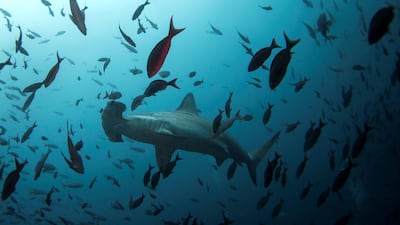Sharks are still being caught and traded offshore despite a seasonal ban, say fishermen on the east coast.
The Ministry of Climate Change and Environment bans the fishing of all sharks and rays during the main breeding season between February 1 and June 30. But fishermen say that sharks accidently caught during the season are being sold for high prices.
“It’s well known that selling sharks makes money and when a fisherman accidentally catches a small shark or other banned species he either throws it back in the water, keeps it for dinner, or sells it to other fishermen outside the country,” said Ahmad Darwesh, a fisherman from Kalba.
A four-year action plan to save sharks from the brink of extinction was released by the Ministry of Climate Change and Environment on Monday.
The UAE has 153 chondrichthyans, a class of cartilaginous fish that includes sharks, rays, skates, sawfish and chimaeras. Of these, 78 species are considered threatened in the Arabian Sea region.
The UAE Shark Assessment Report, released by the Ministry on Monday, states three species have not been recorded in the region for at least three decades and are possibly extinct here. Of the remainder, nearly one in 10 are classified as critically endangered, one in five are endangered and one in five are vulnerable. For 29 species there was simply not enough data to assess their risk of extinction.
The National Plan of Action for the Conservation and Management of Sharks 2018-2021 outlines a detailed strategy to raise public awareness about the importance of shark conservation for the marine ecosystem and enhance research on local shark populations.
Mr Darwesh said: "We respect the authorities' decisions and laws and hope they will share their concerns with us in order to come up with solutions together in a way that would not affect our profession."
Government legislation, however, has not stopped fishermen from catching and trading these keystone species.
“It really depends on the fisherman, how he thinks and if he really cares about the marine life and the country’s regulations because it’s very difficult to catch or monitor fishermen who break the rules in order to make more money,” Mr Darwesh said.
Fishermen on the east coast hide the banned catch and sell it to Omani markets, he said.
“They hide it under the allowed catch and then they either sell it to Omani fishermen or take it home. We all should respect the law and care about the marine life because it’s our source of income and our ancestors’ profession.”
Fishermen evade detection by selling sharks at sea.
“It’s not a common act but it can happen,” said Rashid Al Yamahi, a fisherman from Kalba. “Our fishing nets might accidentally catch a banned fish or a small shark. For me, I put it back in the water even if it is dead because I don’t want to be fined for illegal fishing.”
Small shark sell for Dh100 to Dh700, depending on size and weight.
“It’s tempting for some but most of us stick to the rules and care about the environment and the endangered species,” said Mr Al Yamahi said.
________________
Read More:
UAE biodiversity action plan to save sharks from brink of extinction
Lion heads and ivory: Dubai border patrol halt more than 50 illegally trafficked species
Sharks become victim of most deadly predator in the Gulf
________________
Exporting any shark caught in the UAE's territorial waters is banned, although import is permitted, providing the ministry's requirements are met.
Catches of sharks in the UAE averaged between 1,300 and 1,950 metric tonnes per year between 1986 to 1999, according to reports at the Food and Agriculture Organisation of the United Nations. Since 2012, they have declined to less than 500 metric tonnes per year, despite shark fisheries increasing their range and size in the past 10 years.
Sharks keep ecosystems healthy and prevent the spread of disease by scavenging on the sea floor and keep the fish population healthy by eating old, sick and slower fish.

